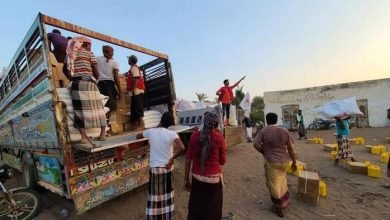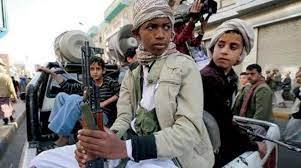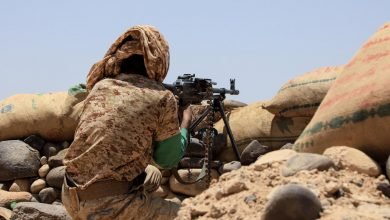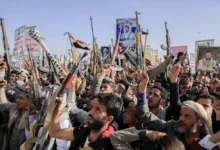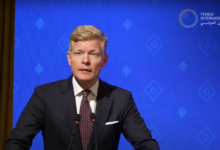Security Council April 2021 Monthly Forecast for Yemen

SMA NEWS – New York
Expected Council Action
In April, the Security Council is expected to hold its monthly briefing, followed by consultations, on Yemen with Special Envoy Martin Griffiths, Under-Secretary-General for Humanitarian Affairs Mark Lowcock, and General Abhijit Guha, who heads the UN Mission to support the Hodeidah Agreement (UNMHA).
Key Recent Developments
The Houthi rebel group continues its offensive to take Marib governorate, rich in oil and gas reserves, and the Yemeni government’s last stronghold in northern Yemen. The frontline lies just outside Marib City, home to around two million people, including many of the one million internally displaced Yemenis who fled to Marib governorate during the war. The Houthis also continue an intensified drone and missile campaign against Saudi Arabia. They claimed responsibility for a 7 March attack on a Saudi Aramco oil company facility at Ras Tanura, the world’s largest oil export terminal, on the Persian Gulf and an attack using armed drones on 19 March ignited a fire at an Aramco installation in Riyadh. Attacks on the six-year anniversary of the Saudi-led coalition’s intervention on behalf of the government on 25 March set fire to a fuel storage tank in Jizan.
Fighting escalated on other fronts in Taiz, Hodeidah and Hajah governorates as government-aligned forces and Saudi Arabia sought to alleviate pressure on Marib. The Saudi-led coalition also intensified airstrikes during March on Sana’a and elsewhere. Briefing the Council on Yemen on 16 March, Griffiths described the war as “back in full force”.
Despite significant diplomatic activity, efforts to secure a nationwide ceasefire, re-open the Sana’a airport, allow the unhindered delivery of fuel and other commodity imports through Hodeidah port, and resume peace talks remained at an impasse. US Special Envoy for Yemen Tim Lenderking undertook a 17-day trip to the region in late February and March to push for a ceasefire plan with Yemeni, Saudi and Houthi officials. Speaking at a 12 March meeting on Yemen organised by the Atlantic Council, a US think tank, Lenderking conveyed a sober assessment on reaching a deal, saying, “Tragically, and somewhat confusingly for me, it appears that the Houthis are prioritizing a military campaign” to seize Marib governorate.
On the humanitarian front, a 1 March virtual donor conference generated pledges of $1.7 billion against the $3.85 billion requested for this year’s Yemen humanitarian response plan. The Secretary-General in a statement described the conference outcome as “disappointing”. Briefing the Council at its 16 March meeting, Lowcock said the result meant that the UN would be unable to stop “the protracted process of starvation” facing millions of Yemenis. The UN also raised the alarm in March about the fuel shortage in northern Yemen that has been driving up prices of food and health care, as the government and coalition have prohibited any fuel imports through Hodeidah ports since January. Yemen also featured prominently at an 11 March open debate on conflict-induced hunger. The meeting included the participation of World Food Programme Executive Director David Beasley, who had just visited Yemen and, with other speakers, warned about the risk of widespread famine in Yemen.
At the 16 March briefing, Nirvana Shawky, the regional director for the Middle East and North Africa of CARE, an international humanitarian organisation operating in Yemen, also briefed. Shawky urged the Council to address economic recovery as an urgent priority, help fill the $2 billion funding gap in the humanitarian response, improve humanitarian access as an “absolute necessity”, and exercise its responsibility to end the war. Council members issued a press statement on 18 March that condemned the fighting in Marib and cross-border attacks against Saudi Arabia. It stressed “the need for a de-escalation by all, including an immediate end to the Houthi escalation in Marib”.
On 22 March, Saudi Arabia proposed a plan for a ceasefire under UN supervision, the re-opening of Sana’a airport to several regional and international destinations, the deposit of oil revenues from ships entering Hodeidah into a joint account in the Central Bank’s Hodeidah branch, and the resumption of peace talks. The Secretary-General released a statement welcoming the Saudi announcement.
March also saw a number of deadly incidents involving migrants. On 7 March, a fire at a Houthi-run detention facility in Sana’a killed at least 45 Ethiopian migrants and injured 170 others. At the Council’s March briefing, Griffiths called for an independent investigation into the incident. On 21 March, the Houthis announced the arrest of 11 security personnel and a number of senior personnel, saying guards had fired three tear gas canisters into the facility that started the fire. On 4 March, at least 20 migrants drowned when human traffickers forced dozens of passengers to jump off a crowded boat in Djibouti bound for Yemen.
A second wave of COVID-19 spread through Yemen during March. On 23 March, the government declared a health emergency in areas under its control. The transportation minister of the Houthi authorities in Sana’a, Zakaria al-Shami, died from coronavirus on 21 March, while Houthi Prime Minister Abdulaziz bin Habtour was hospitalised.
Sanctions-Related Developments
On 26 March, the Yemen Panel of Experts briefed the 2140 Yemen Sanctions Committee on its investigation into the 30 December 2020 attack on Aden airport that targeted the new Yemeni cabinet arriving from Saudi Arabia. According to a confidential “ad hoc” report, which was shared with the Committee, the Panel apparently determined that the rockets used in the attack were fired from Houthi-controlled territory and were known to be used only by the Houthis. The Panel did not go so far as to assign responsibility to the Houthis and will report further on the incident in its mid-term update.
Towards the end of March, the Panel informed the Committee that it planned to conduct a complete review of its findings in the finance section of its January final report regarding the misuse of the Saudi deposit to the Yemeni Central Bank. It said that section IX.B and annex 28, as well as related commentary in the executive summary, and Table 1 should be disregarded. In addition, the Panel’s finance expert resigned.
Women, Peace and Security
On 2 March, the Informal Experts Group (IEG) on women, peace and security held its fourth meeting on Yemen. Griffiths; David Gressly, Resident and Humanitarian Coordinator for Yemen; and General Guha briefed the IEG. Key recommendations were also conveyed to Council members by UN Women and further observations were presented by the Office of the Special Representative of the Secretary-General on Sexual Violence in Conflict.
The summary shared by the co-chairs of the IEG, Ireland and Mexico, and the UK as penholder on women, peace and security, contains the main issues raised and the proposals made by UN entities. Among the key topics were the under-representation and exclusion of women in Yemen from peace negotiations, political talks and decision-making. One example given was the total lack of women in the recently formed 24-member cabinet of the government. Griffith, in October 2020, had publicly committed to include women in all upcoming talks and his office has been involved in supporting and engaging the local female Yemeni community safety actors in the context of negotiations for a ceasefire and confidence building measures.
Regarding conflict-related sexual violence, the Office of the Special Representative of the Secretary-General on Sexual Violence in Conflict emphasised that all parties to the conflict have committed such crimes. The parties had not committed to preventing conflict-related sexual violence nor had they taken any remedial action. In that context, the SRSG’s office welcomed the adoption of resolution 2564 on Yemen sanctions. With the resolution, the Council added Houthi official Sultan Saleh Aida Aida Zabin to the sanctions list for his role in overseeing a policy of intimidation and the use of systematic arrest, detention, torture, and sexual violence against politically active women.
UN representatives provided Council members with recommendations in response to the concerns raised. Regarding the renewal of UNMHA’s mandate, the Council could call on UNMHA to systematically engage with women’s organisations and to report on that engagement. The Council was also advised to call on the conflict parties to commit to the prevention of conflict-related sexual violence. Regarding the Yemen Sanctions Committee, the recommendation was for Committee members to consider further listings of individuals identified by the Panel of Experts as responsible for crimes against women. Possible Council action included continuing to invite Yemeni female civil society briefers to participate in the monthly Yemen meetings. Another recommendation was for Council members to support the deployment of women protection advisors.
Key Issues and Options
A key issue is the battle in Marib. If Marib City falls and the Houthis seize the governorate, it would affect the balance of power in any future peace process, significantly weakening the government’s position. Council members are likely to monitor developments and support diplomatic initiatives for a ceasefire. They could seek an emergency meeting on developments around Marib City, reiterate calls for a de-escalation, and threaten sanctions on additional Houthi officials, military leaders and economic agents if they push forward with the attack.
The Marib fighting could also worsen the humanitarian crisis, especially if it triggers mass displacement of civilians and puts stress on national relief efforts to prevent famine. Along with generating more humanitarian funding and relieving the fuel crisis, measures to support the economy, such as stabilising the Yemeni rial, are important to ensure people can afford food. Council members may reiterate calls for donors to provide additional funding to the humanitarian response and to inject hard currency into Yemen’s Central Bank to bolster the currency.
Another significant issue remains the environmental threat posed by the moored FSO Safer oil tanker in the Red Sea, which the UN remains unable to access despite previous Houthi commitments to allow it to deploy a team to assess the ship and conduct emergency repairs.
Sustaining the Saudi Arabia-brokered Riyadh Agreement, the power-sharing accord between the Yemeni government and the separatist Southern Transitional Council (STC), is also important for resolving the Yemen conflict. A related issue is how to promote an inclusive political process that would involve Yemen’s multiple armed groups and other stakeholders besides the Houthis and the government.
Council Dynamics
Council members support the Special Envoy and his mediation efforts. Members further share concerns about the humanitarian situation and the threat posed by the decrepit Safer oil tanker. The new US administration has placed a focus on ending Yemen’s war, and this has reinvigorated diplomatic engagement. A rare joint statement by the P3, Germany and Italy on 11 March condemned the Houthi offensive on Marib City and attacks against Saudi Arabia, asserting that “renewed diplomatic efforts to end the Yemen conflict, in support of the UN Special Envoy, with the support of Saudi Arabia, Oman, and the international community, offer the best hope for ending this war”.
Russia often raises concerns about the Council’s singling out the Houthis, which it believes could give the appearance of bias. This dynamic played out during negotiations on the 18 March press statement, which led to streamlining references to the Houthis and the removal of language on the Safer oil tanker in exchange for keeping one reference to the “Houthi escalation in Marib”. Russia also questioned last month the Panel’s mandate for being able to investigate the Aden attack.
The UK is the penholder on Yemen. Ambassador I. Rhonda King (Saint Vincent and the Grenadines) chairs the 2140 Sanctions Committee.



